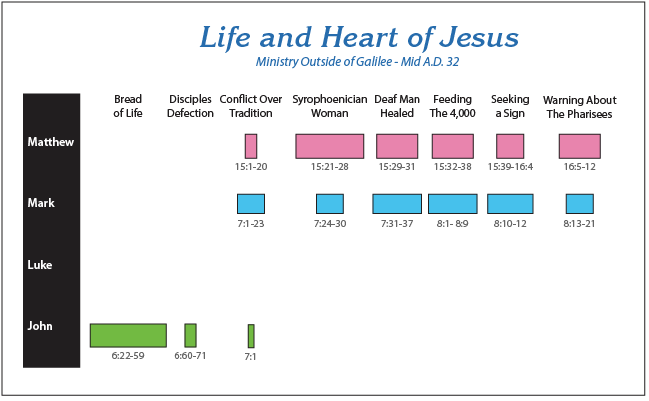After Jesus returned to the city of Bethsaida near Capernaum, He did not have very much time to Himself. Some from the massive crowd that He had fed miraculously from five loaves and two fishes had finally found Him. The discussion that followed between them and Jesus was all about eating bread. What a fitting topic – bread! They had eaten bread and so Jesus talked about bread. He started with the manna that had come down from heaven when the Israelites were in the wilderness on their journey out of Egypt. It was good food to keep one physically alive. But it was worthless food for providing eternal life because those who ate the manna in the wilderness died (John 6:49). But Jesus’ bread was different. Jesus’ bread was Himself. He was the true bread (John 6:32-35). Jesus declared that those who come to Him will not hunger. He was not like that old, spoiling manna. He was the Bread of Life! Those who “ate” Him would live forever (John 6:47)! You see, Jesus has been and is all that anyone needs. You need nothing else. I trust that as you read this, Jesus is all that you will want. I trust that you will find Him to meet your deep desires – everything that you desire. Otherwise, you will have truly missed Jesus. He is the Living Water and He is the Bread of Life. He is the “living everything!” He is the source of spiritual life!

Disturbing Statement
Jesus ended His teaching opportunity by saying that one must also eat His flesh and drink His blood. It was a figurative expression referring to His future death. Here is Jesus’ statement,
Truly, truly, I say to you, unless you eat the flesh of the Son of Man and drink His blood, you have no life in yourselves. He who eats My flesh and drinks My blood has eternal life, and I will raise him up on the last day. John 6:53-54 (NASB)
Jesus’ point was that it is not enough to listen to His teachings and be impressed with His miracles. One must accept His physical death and His return to life in order to be forgiven of one’s sins. Otherwise, one will not live forever with God (John 6:53). This was a radical concept for anyone who was listening.

Difficult Statement
When Jesus’ disciples heard this, they were troubled. Listen to their words,
Therefore many of His disciples, when they heard this said, “This is a difficult statement; who can listen to it?” John 6:60(NASB)
For those who were standing there and listening, we can understand why this was difficult to hear. What would you think if a man talked about eating His flesh, drinking His blood, being the Bread of Life, and giving you eternal life? Many would struggle with such words. But Jesus used such illustrations to get people to think, and the people were thinking. Then Jesus responded to them,
But Jesus, conscious that His disciples grumbled at this, said to them, “Does this cause you to stumble? What then if you see the Son of Man ascending to where He was before?” John 6:61-62 (NASB)
Jesus’ question must have surprised them. How did He know, and how would they respond? Notice how Jesus referred to Himself. He calls Himself the Son of Man. Jesus is emphasizing His humanity – His fleshly body and His return back to heaven. Yes, He was a man but He was also God.
Those who had found Jesus’ words difficult did not understand the divine message. Jesus explains,
It is the Spirit who gives life; the flesh profits nothing; the words that I have spoken to you are spirit and are life. But there are some of you who do not believe. For Jesus knew from the beginning who they were who did not believe, and who it was that would betray Him. John 6:63-64 (NASB)
Those who struggled with Jesus’ words were those who did not believe Him. Their problem was not that they needed a scholarly book and spectacular presentation to convince them about Jesus. Today, we sometimes think that all people need is a great book that refutes evolution and endorses creation, a book that defends the accuracy of the Bible, or a CD or DVD that presents some archaeological discovery about the Christian faith. The truth is they just need to read one of the divinely inspired gospels about Jesus, and God will speak to them. Otherwise, they will never understand. God wrote the scriptures. The words of the scriptures pierce to the heart and soul (Hebrews 4:12). They convict and lead one to Jesus. Jesus said that His words were spiritual words. One needs the Holy Spirit to help him or her understand (1 Corinthians 2:12-14).

Paradoxical Statement
Many did not understand Jesus because they did not believe, and many did not believe because God the Father had not chosen them to believe. That is Jesus’ next statement. He repeated His previous message in John 6:37, 44 from a different perspective.
And He was saying, “For this reason I have said to you, that no one can come to Me unless it has been granted him from the Father.” John 6:65 (NASB)
Jesus’ point is that they did not believe Him because God the Father had not granted them permission to respond to His teaching. What an amazing and problematic thought. One cannot “come to,” that is, believe in Jesus unless God the Father grants them permission. God the Father had not granted many in the crowd permission to believe and so many would not believe. We discovered in our last study that one will not come to Jesus unless God the Father has 1) granted them permission (John 6:65). Once granted permission, the Father will draw them to Jesus (John 6:44), and they will come (John 6:37).
For a full explanation about the meaning of this verse, please visit the last study “Bread of Life, part 2” and the study called “Predestination and Free Will.” We do not understand the paradox of 1) God choosing men and women to believe in Jesus and yet 2) men and women having the choice to respond to Jesus in faith. Scripture teaches both truths, so both are truth. Otherwise, how do we understand the sad tone of the next statements,
As a result of this many of His disciples withdrew and were not walking with Him anymore. So Jesus said to the twelve, “You do not want to go away also, do you?” John 6:66-67 (NASB)
Notice that many of the crowd left Jesus. Today, this would be devastating to many preachers, teachers, churches and para-church organizations. To see “many” leave would be crushing. That would be total rejection. They would most likely wonder what they did wrong. Some modern day church leaders would start worrying about the church’s finances. Others would criticize the pastor and the other church leaders. Some would wonder if they should have avoided preaching or teaching certain things, because some doctrines offend people and motivate some to leave. But Jesus ignored such self-centered concerns. He spoke the truth and He realized some would respond negatively. Some did, and they left. This is an important example for every church leader and member. Never avoid the truth but teach it with grace and compassion. Our goal is not how many attend but being used by God to help people believe in Jesus and to grow spiritually.
Read Jesus’ last statement again, “Do you want to go away also?” There is emotion in those words. I wonder how Jesus felt? “Will you leave too?” Someone has said,
We really only need five things on this earth: Some food, some sun, some work, some fun, and someone.
It is emotionally difficult when people leave for the wrong reasons.
Mixed Emotions
Then Peter encouraged Jesus with these words,
Simon Peter answered Him, “Lord, to whom shall we go? You have words of eternal life. We have believed and have come to know that You are the Holy One of God.” John 6:68-69 (NASB)
“To whom shall we go, Lord?” As far as Peter was concerned, there was no one else. We have believed! The Greek word for “believed” comes from the verb PISTEUO. It is in the perfect tense. This implies that the disciples had already believed and were still believing. This is the mark of a true follower of Jesus Christ. One who truly believes will never stop believing.
They went out from us, but they were not really of us; for if they had been of us, they would have remained with us; but they went out, so that it would be shown that they all are not of us. 1 John 2:19 (NASB)
Oh, they might stumble here or there, but a true follower believes, continues to believe, and does what God commands.
Peter and most of the disciples believed that Jesus was the “Holy One” of God. They believed He was the “Righteous One” – the promised Messiah. But Jesus knew that Peter did not know everything and that his statement was not completely accurate. There was one among them who did not believe. His name was Judas Iscariot.
Jesus answered them, “Did I Myself not choose you, the twelve, and yet one of you is a devil?” Now He meant Judas the son of Simon Iscariot, for he, one of the twelve, was going to betray Him. John 6:70-71 (NASB)
Judas’ problem was not that he stopped believing. His problem was that he never, ever believed. There is someone like him in every church. Not that they are traitors, but they are among us and do not really believe. They may even think that they are real believers.
Conclusion
There were four groups of people that Jesus taught on this occasion.
The first group was the Jewish religious leaders. They had made it clear early in Jesus’ ministry that they had rejected Him when they declared that He exorcised demons using demonic powers. They had criticized Him for healing those who were in need, and they challenged His teaching. They repeatedly attempted to discredit Jesus before the crowds in any way they could. They were wicked and unbelieving men with a polished exterior. There are some today who reject Jesus giving various reasons. But as one evolutionist admitted, he rejected the Bible because he rejected God. If you reject the concept of a god or the concept of the God of the Bible, then you will never search for or find the God of the universe.
The second group was a large number of so-called believers. They followed Jesus because He was thrilling. In Jesus’ day people did not have television, novels to read, magazines, newspapers, the internet, or radios to listen to. It must have been great for them to leave their homes and listen and watch Him – what great entertainment! But after awhile, Jesus seemed to get too serious. After awhile others must have thought that He was divine or something – maybe even God. If Jesus had just stayed with His “magic tricks” – casting out demons, healing the sick, feeding probably twenty thousand people from two fish and five loaves of bread, and raising the dead – and had avoided some of His more controversial teachings, then the crowds would have stayed. Jesus could have had a big ministry with tens of thousands of people. Maybe the religious leaders would have liked Him too! But Jesus did not do that. Instead, He taught them that He was the Bread of Life. He was divine. He came down out of heaven and God was His father. Now, who would have believed such things? Consequently, many of the crowd left Jesus. They left Him alone with a much smaller group.
The third group included His own twelve disciples and a small group of unnamed disciples. Jesus had called the twelve one by one. The twelve had spent time with Jesus. They saw His miracles and heard Him teach. They ate with Him. If anyone knew Jesus, the twelve did. And it was this group that stayed with Jesus, except for a brief time. They would eventually die following Him, preaching and teaching for Him, and helping others find Jesus as their Messiah.
The last group was just one individual – Judas Iscariot – a traitor. He appeared to be one of them, but he wasn’t. Unfortunately, there are always some who claim to follow Jesus just like Judas. Eventually, they will slip away when times are difficult or if something “better comes along.”
To which group do you belong? To which group do you claim to belong? What type of follower are you? William Barclay writes,
It is possible to be a follower of Jesus without being a disciple; to be a camp follower without being a soldier of the king; to be a hanger-on in some great work without pulling one’s weight. Once someone was talking to a great scholar about a younger man. He said, “So and so tells me that he was one of your students.” The teacher answered devastatingly, “He may have attended my lectures, but he was not one of my students.” You see, there is a world of difference between attending lectures and being a student.[1]
If you do not belong to Jesus yet, you can if you want to. He is the One who came into this world and died a human death in order to forgive your sins. Stop and pray to God. Tell God that you want His forgiveness, that you believe He died for your sins and returned to life and that you want Him to change your life. If you are sincere, He will give you eternal life, and you will have a place in heaven some day.
Maybe you belong to Jesus. If so, Peter and the other disciples are examples of what God wants from you. He wants you to follow Him. They were ready to live for Him in this life, and ready to die for Him. If you have believed in Jesus Christ, the Righteous One, I hope the following song is your song.
Living for Jesus, a life that is true,
Striving to please Him in all that I do;
Yielding allegiance, glad hearted and free,
This is the pathway of blessing for me.
O Jesus, Lord and Savior, I give myself to You,
For You, in Your atonement, didst give Yourself for me.
I own no other Master, my heart shall be Your throne.
My life I give, henceforth to live, O Christ, for You alone.
– Thomas Obediah Chisholm
For a discussion about man’s choice and God’s choice in salvation, please read “Predestination and Free Will.”
References:
1. William Barclay. The Gospel of Luke. p. 595.